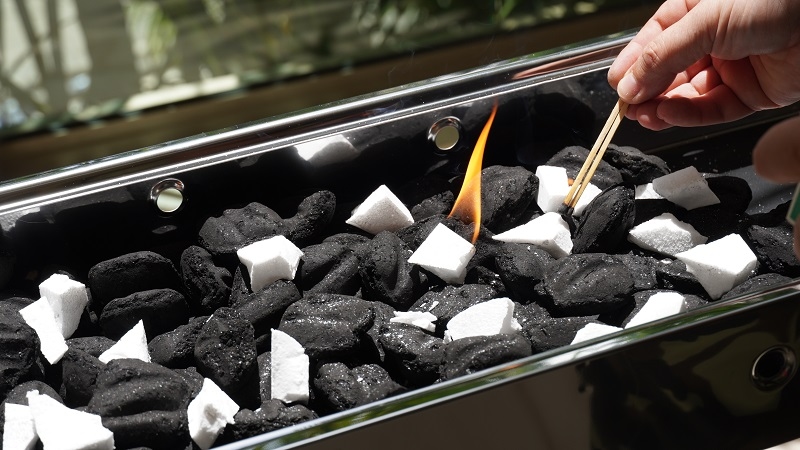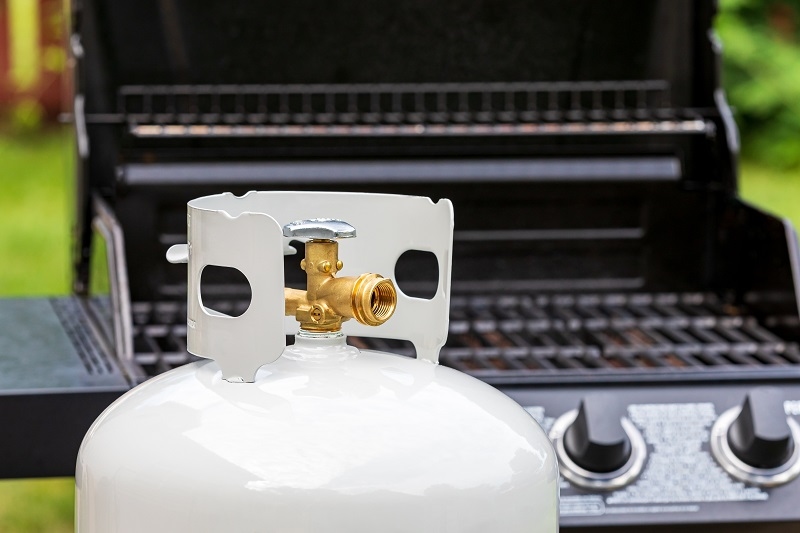Guide To Choose the Right Fuel for Grilling Made Simple

The sound of a perfectly grilled steak sizzling, the smoky smell in the backyard, and the comforting crackle of a well-stoked fire are the sonatas of grilling. But, at the core of every great grilled meal is the choice of fuel type. Choosing a fuel type for grilling is much more than just heating; it will affect flavor, temperature control, cooking times, and even the essence of BBQing. Whether you're a weekend warrior or a skilled pitmaster, learning about your fuel options for grilling is the first step in unlocking your grill's true potential. Let's go ahead and explore the world of embers and flames to help you pick the accompaniment for your grilling endeavor.
The Heart of the Flame: Why Your Fuel Choice Matters
Selecting the right grill or smoker fuel is not just a logistical decision but a philosophical one. The choice bridges a simple weekday meal and a slow sutra of weekend feasting. The fuel will determine:
- Flavor Profile: This is probably the most critical factor. Charcoal and wood inherently have a flavor—smokiness—that gas does not. On the other hand, gas provides a clean, pure, and unadulterated flavor.
- Heat Control: How easy is it to control the heat? Gas grills are really just about turning the knob, while preventing a charcoal fire is more akin to an art.
- Heat Intensity: To get proper sear takes heat, heat that is direct; some fuel is better at producing and maintaining that heat than others.
- Time to Preheat: Gas grills are a matter of just turning them on, and you're cooking in a few minutes; charcoal takes longer to preheat, thus it provides an opportunity to slow down and enjoy the process of grilling!
- Total Experience: Do you enjoy the skill of fire-making and fire management for the cooking experience, or do you push the button and you are done?
We want you to know that knowing these opportunities is critical for selecting the best fuel for your grilling.
Charcoal: The Classic Choice for Pure BBQ Flavor
For many purist devotees, charcoal is the only fuel for charcoal grilling aficionados. Grillers cherish the flavor it gives food and its high-heat searing ability. Regardless, not all charcoal is created equal.
Types of Charcoal Fuel:
- Lump Charcoal: It is made from pure, burned hardwood. This is for those grillers who want a natural experience. It lights faster, the burn is hotter, and since it is irregularly shaped, it creates different heat zones, making it perfect for 2-zone cooking. Plus, it produces less ash. The downside? It goes out faster, and it can be more expensive.
- Briquettes: are uniform pillows made from compressed sawdust, coal dust, or other binding agents and additives. This type of charcoal is favored for its uniformity, long burn time, lower cost, and steady, even heat, making it great for long cooks. Although some brands, if not all-natural, may contain chemicals and leave an off-flavor in food.
Pros and Cons of Charcoal
Pros:
- Unmatched, genuine smoky taste.
- Gets hot enough to reach sizzling levels.
- The traditional grilling experience that many people enjoy.
- Typically less expensive than gas-grill setups.
Cons:
- Longer preheat time (20-30 minutes).
- Less precision in temperature control with vent adjustment is needed.
- Creates more ash and requires cleanup after every grilling session.
- Can be messier to deal with.

Propane and Natural Gas: The Kings of Convenience
When it comes to convenience, gas definitely reigns supreme. Propane, which can be stored in portable tanks that can be filled, exchanged, or replaced, and natural gas, which can be used with a gas grill as long as the grill is attached to a gas line with a dedicated hookup in your home, can be used as fuel for gas grills. Either way, cooking efficiency is key.
Propane
Because it can be stored in portable tanks, propane is flexible and allows you to put your grill wherever you want. However, you'll have to keep an eye on the tank and be prepared to fill it or exchange it consistently.
Natural Gas
Natural gas can be an endless fuel if your grill has a dedicated gas line. You'll never run out of gas in the middle of a burger again. The downside is that you'll be stuck in the same spot with your grill.
Pros and Cons of Gas
Pros:
- Ultimate convenience, ready to go in under 10 minutes.
- Great to excellent temperature control at the turn of the knob.
- Burns clean with little to no ash or mess.
- Great for beginners.
Cons:
- Gives little to no inherent smoky flavor. You can use a smoke box to create a smoky flavor.
- Generally doesn't burn as hot as charcoal for searing meats.
- Can be a more expensive grill upfront, and if natural gas, with installation.
Wood Pellets: The Versatile Hybrid
Recently, pellet grills have gained enormous popularity as unique hybrid devices. They use small, compressed wood pellets as the grilling fuel. The grilling experience offers the convenience of set-and-forget gas cooking with the flavor of food cooked on a wood-burning grill or smoker.
How Pellet Grills Work
A specific model has an electronic hopper that will feed the pellets into a fire pot, and the pellets are fed by an auger, along with a specifically designed electric igniter, to create a controlled fire. A digital controller allows you to set a precise temperature in the grill, and it will control/"automatically" feed the pellets to maintain that temperature. This is the biggest advantage—grilling, low and slow smoking, hot and fast grilling, and even baking.
Pros and Cons of Pellets
Pros:
- Excellent control of temperature, always consistent.
- Get the true, authentic flavor of wood smoke.
- Incredible versatility—grilling, smoking, roasting, and baking.
- Other advantages of pellet grills are "set it and forget it" ease of use.
Cons:
- Requires electricity to function, therefore requiring a place to plug in, limiting the grill's portability.
- Initial investment is typically more expensive than many charcoal or propane grills.
- Pellets have to be kept dry.
Exploring the Fringe: Specialty Fuels and Electricity
Beyond the big three, there are other types of fuels for grills and smokers worth mentioning for specific applications.
- Wood Logs: The original fuel for barbecue grills, wood logs are primarily used in offset smokers for authentic Texas-style barbecue. They require significant skill to manage the fire and maintain consistent temperatures, but deliver the deepest, most decadent smoke flavor.
- Electric Grills: While not a "fuel" in the traditional sense, electric elements generate the heat. These are fantastic for apartments, balconies, or anywhere open flames are prohibited. They are clean and easy but offer no smoke flavor and less intense heat.
Choosing Your Champion: How to Select the Best Fuel for Grilling
So, what do you think about the best fuel for grilling? Ask yourself these questions:
- What’s my priority: flavor or convenience? If flavor is everything, lean towards charcoal or pellets. If you value quick, easy meals, gas is your friend.
- What do I like to cook? If you're a steak-searing enthusiast, fuel for a charcoal grill is ideal. A pellet grill or a charcoal smoker is perfect if you love pulled pork and brisket. For everyday burgers and veggies, a gas grill excels.
- What’s my budget? Consider both the grill's initial cost and the fuel's ongoing cost.
- How much time do I have? Be honest. If you have 15 minutes to get dinner on the table, charcoal will be frustrating.
Safety First: Handling Your Fuel Responsibly
No matter which path you choose, safety is paramount when dealing with any fuel for a grill.
- Charcoal: Only use it in a well-ventilated area (never indoors), and dispose of the ashes in a metal container only after they are completely cold.
- Propane: Always check connections for leaks with a soapy water solution and store tanks upright and outdoors.
- General: Keep your grill clean to prevent flare-ups, and always have a fire extinguisher nearby.
Read More: Master the Art of Grill Deep Cleaning: Step-by-Step Guide
Conclusion
The journey to find the perfect fuel for grilling is personal, rooted in your taste, technique, and lifestyle. There is no single "best" answer, only your best choice. Charcoal offers timeless flavor, gas provides unmatched ease, and pellets deliver high-tech versatility. By understanding the strengths of each option, you can confidently select the fuel that will transform your backyard into a true culinary destination, one perfect meal at a time.
This content was created by AI

